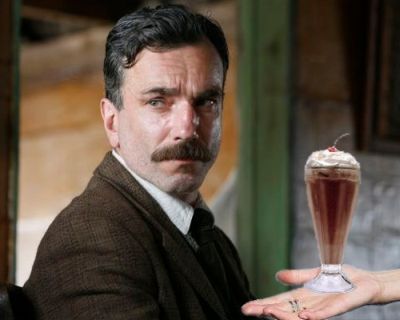
[here there be mild spoilers me hearties, yarrr]
After a couple days of deliberation, I've made up my mind: There Will Be Blood is an awesome, awesome movie. Complicated and muddled, but awesome. I will need to see it again, I think, to make sure, but for now you can count me on the pro-milkshake side of things.
There cannot be any discussion about the beginning of the story. It's just phenomenal. From the brilliantly dialogue-free opening through the midpoint, we are talking about a perfect, colorful, and unarguably ingenious look into the early workings of oil industry, with the amoral Daniel Plainview as our guide and storytelling proxy.
Where opinion hinges is the story's subsequent change in focus. Once the oil is flowing with no end in sight, the film stares unendingly at Plainview himself. We move away from Plainview's tete-a-tete with minister Eli Sunday, and his increasingly odd relationship with his adopted son, towards a non-sequitur sidebar involving his half-brother. Guns and violence enter the equation. An embarrassing run-in with Sunday is played as comedy. Plainview, like the film, flails back and forth, around and around, until the inevitable devastating finale... all the while touching upon the business of oil only tangentially.
Then again, once the problem of getting at Little Boston's oil is laid to rest, the story's conundrum becomes that of Plainview: now what? And appropriately, each mirrors the other as they descend into madness and loss. Logic and reason disappear, but Plainview remains a force to be reckoned with.
And therein lies the problem. For some, that curveball represented a loss of focus, and a lack of purpose, on the part of P.T. Anderson. His conclusion leaves the oil industry behind, leaving nothing said about the after-effects of the industry on Little Boston, which seems to have been interpreted as laying up, copping out. We were promised an oil movie, and it became a tale about what we're supposed to do after reaching our goals.
What's wrong with that?
So the movie's not really about oil. Blood has more to say about wealth and success than it has to say about oil. The oil's a nice metaphor for human spirit and soul being sold off and sucked up, but Anderson clearly isn't as concerned with the further workings of the oil industry's upper echelon as he is with the question of what a bull like Plainview is supposed to do once he's reached the top. Concentrate on family? Rediscover old friendships? Let bygones be bygones? Enjoy the little things?
His run-in with Standard Oil lays out the problem very nicely: not only does Plainview see retirement, cashing in his chips, as acquiescence, but the argument over family's role in Plainview's life asks the question of of what else Plainview wants. Except he's just an oil man. He wants oil. And he's got it. And that's that. What happens then?
There's also the question of class and class mobility. It takes a force of nature to pull oneself from nothing up to the upper class. It requires ruthless struggle for survival, and blinding focus on vocation and purpose. All of that is certainly the case with Daniel Plainview, who begins as a solo, broken-legged dirt dog and becomes a millionaire. When that person reaches the top, does that attitude change? Why would it? Why should it? Why would someone so fixated upon competition ever just stop and rest?
I know this: those questions are a lot more interesting than seeing the oil industry develop for another hour.
I'll have to see it again to know just how good There Will Be Blood really is. But I do know that Anderson has answered, demonstrably, all the questions raised by his uneven work in Magnolia and Punch-Drunk Love. It's a rich, mature work of genius. And a hell of a movie.
No comments:
Post a Comment